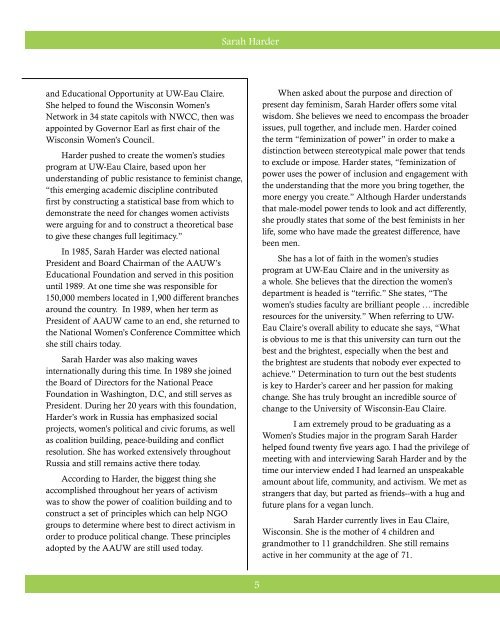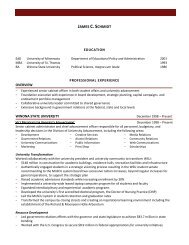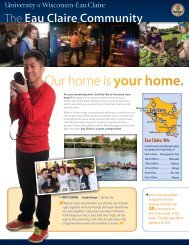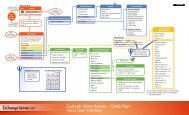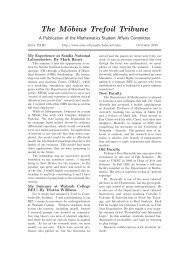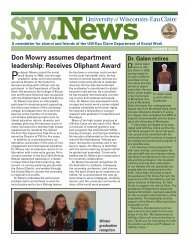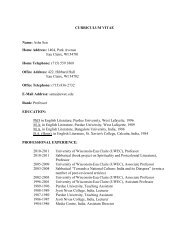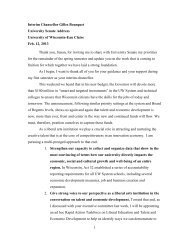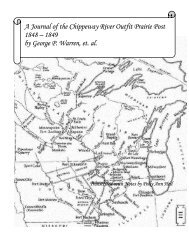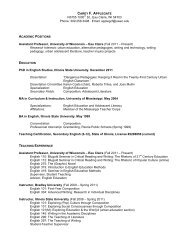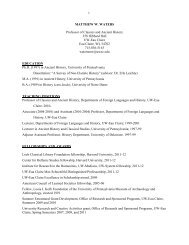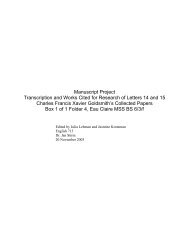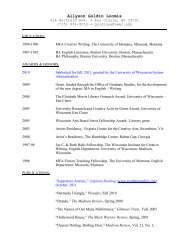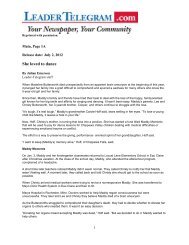Sarah Harder - University of Wisconsin-Eau Claire
Sarah Harder - University of Wisconsin-Eau Claire
Sarah Harder - University of Wisconsin-Eau Claire
You also want an ePaper? Increase the reach of your titles
YUMPU automatically turns print PDFs into web optimized ePapers that Google loves.
and Educational Opportunity at UW-<strong>Eau</strong> <strong>Claire</strong>.<br />
She helped to found the <strong>Wisconsin</strong> Women’s<br />
Network in 34 state capitols with NWCC, then was<br />
appointed by Governor Earl as first chair <strong>of</strong> the<br />
<strong>Wisconsin</strong> Women’s Council.<br />
<strong>Harder</strong> pushed to create the women’s studies<br />
program at UW-<strong>Eau</strong> <strong>Claire</strong>, based upon her<br />
understanding <strong>of</strong> public resistance to feminist change,<br />
“this emerging academic discipline contributed<br />
first by constructing a statistical base from which to<br />
demonstrate the need for changes women activists<br />
were arguing for and to construct a theoretical base<br />
to give these changes full legitimacy.”<br />
In 1985, <strong>Sarah</strong> <strong>Harder</strong> was elected national<br />
President and Board Chairman <strong>of</strong> the AAUW’s<br />
Educational Foundation and served in this position<br />
until 1989. At one time she was responsible for<br />
150,000 members located in 1,900 different branches<br />
around the country. In 1989, when her term as<br />
President <strong>of</strong> AAUW came to an end, she returned to<br />
the National Women’s Conference Committee which<br />
she still chairs today.<br />
<strong>Sarah</strong> <strong>Harder</strong> was also making waves<br />
internationally during this time. In 1989 she joined<br />
the Board <strong>of</strong> Directors for the National Peace<br />
Foundation in Washington, D.C, and still serves as<br />
President. During her 20 years with this foundation,<br />
<strong>Harder</strong>’s work in Russia has emphasized social<br />
projects, women’s political and civic forums, as well<br />
as coalition building, peace-building and conflict<br />
resolution. She has worked extensively throughout<br />
Russia and still remains active there today.<br />
According to <strong>Harder</strong>, the biggest thing she<br />
accomplished throughout her years <strong>of</strong> activism<br />
was to show the power <strong>of</strong> coalition building and to<br />
construct a set <strong>of</strong> principles which can help NGO<br />
groups to determine where best to direct activism in<br />
order to produce political change. These principles<br />
adopted by the AAUW are still used today.<br />
<strong>Sarah</strong> <strong>Harder</strong><br />
5<br />
When asked about the purpose and direction <strong>of</strong><br />
present day feminism, <strong>Sarah</strong> <strong>Harder</strong> <strong>of</strong>fers some vital<br />
wisdom. She believes we need to encompass the broader<br />
issues, pull together, and include men. <strong>Harder</strong> coined<br />
the term “feminization <strong>of</strong> power” in order to make a<br />
distinction between stereotypical male power that tends<br />
to exclude or impose. <strong>Harder</strong> states, “feminization <strong>of</strong><br />
power uses the power <strong>of</strong> inclusion and engagement with<br />
the understanding that the more you bring together, the<br />
more energy you create.” Although <strong>Harder</strong> understands<br />
that male-model power tends to look and act differently,<br />
she proudly states that some <strong>of</strong> the best feminists in her<br />
life, some who have made the greatest difference, have<br />
been men.<br />
She has a lot <strong>of</strong> faith in the women’s studies<br />
program at UW-<strong>Eau</strong> <strong>Claire</strong> and in the university as<br />
a whole. She believes that the direction the women’s<br />
department is headed is “terrific.” She states, “The<br />
women’s studies faculty are brilliant people … incredible<br />
resources for the university.” When referring to UW-<br />
<strong>Eau</strong> <strong>Claire</strong>’s overall ability to educate she says, “What<br />
is obvious to me is that this university can turn out the<br />
best and the brightest, especially when the best and<br />
the brightest are students that nobody ever expected to<br />
achieve.” Determination to turn out the best students<br />
is key to <strong>Harder</strong>’s career and her passion for making<br />
change. She has truly brought an incredible source <strong>of</strong><br />
change to the <strong>University</strong> <strong>of</strong> <strong>Wisconsin</strong>-<strong>Eau</strong> <strong>Claire</strong>.<br />
I am extremely proud to be graduating as a<br />
Women’s Studies major in the program <strong>Sarah</strong> <strong>Harder</strong><br />
helped found twenty five years ago. I had the privilege <strong>of</strong><br />
meeting with and interviewing <strong>Sarah</strong> <strong>Harder</strong> and by the<br />
time our interview ended I had learned an unspeakable<br />
amount about life, community, and activism. We met as<br />
strangers that day, but parted as friends--with a hug and<br />
future plans for a vegan lunch.<br />
<strong>Sarah</strong> <strong>Harder</strong> currently lives in <strong>Eau</strong> <strong>Claire</strong>,<br />
<strong>Wisconsin</strong>. She is the mother <strong>of</strong> 4 children and<br />
grandmother to 11 grandchildren. She still remains<br />
active in her community at the age <strong>of</strong> 71.


